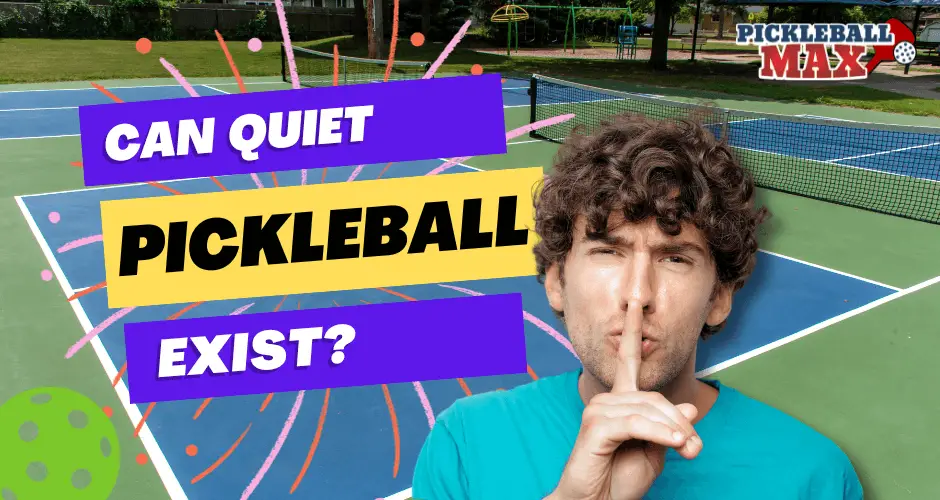
Ahhh, the sound of pickleballs being hit on the courts in the early morning hours. To some, it’s a sweet sound calling them to the courts and getting them excited for another day of play. To others, it’s painful to their ears. It begs the question, can quiet pickleball exist? Is that even good for the sport?
As the sport has grown in popularity over recent years, the demand for courts has risen. Municipalities and HOA communities are beginning to add courts. However, with the new courts comes the noise the sport makes. For those who enjoy pickleball, it can be a comforting sound. And for those who don’t play, but live near courts, the frequent sound can be deafening. That high-pitched sound has created lawsuits, citizen backlash, and city boards instituting ordinances.
Sensitivities
As someone who experiences sensitivity to chemicals, I can sympathize with those who are sensitive to noise. However, as much as I would love to ask someone to use a different laundry detergent, stop smoking, or not spray roundup in their yard, I take my own precautions to deal with it. We are supposed to live in a free society. (Actually, not using toxic chemicals would be a good thing and better for everyone’s health, but each person has their own choice to make).
Pickleball, on the other hand, provides many health benefits. It shouldn’t be stopped because people have issues with the noise of a ball bouncing on a court. I do, however, feel for those who have bought homes near a tennis court, and now those courts are being converted to pickleball. If they would have known it was going to be loud, they probably wouldn’t have moved there in the first place.
Why Is Pickleball So Noisy?
Pickleball is noisy for a few reasons. Both the paddle and ball are hard. Try throwing a hard plastic ball on the cement pavement. It’s going to make some noise. Now try striking the ball to the ground with a hard paddle. The sound increases. Pickleball is played with a solid paddle, not a stringed racket. Some have used sound meters to test the sound of a bouncing pickleball. Depending on the source, I have read the sound can be anywhere from 40 – 70 decibels.
In addition to the equipment making noise, so do the players. Pickleball is a social sport. That’s one of the reasons why people love it. When on the court, players may yell or laugh. Also, when players are standing around the court waiting for the next game, they’re going to talk and laugh. Some may even cheer on those who are playing.
How To Make Pickleball Quiet
Since pickleball is a beneficial sport, there should be some common ground. Quiet hours might be an option, but what about the courts in Florida or Arizona where the weather gets extremely hot? Those players need to play in the early morning hours before the heat starts. Otherwise, it’s a detriment to their health since they can pass out on the court from the heat. Starting at 7 a.m. before their neighbors wake up, or playing at night after the sun goes down might be their only option.
Putting acoustic padding or fencing around the court may help, but it can be costly.
You can use a softer ball or even Gamma foam pickleballs. Foam balls are not the standard and aren’t approved for tournaments. However, they may solve the problem if your neighbors are complaining and you still want to play recreationally on nearby courts.
In regards to paddles, you can try ones with a softer paddle face and a thicker core (keep away from a Nomex core).
USA Pickleball Quiet Category
In an effort to maintain a positive relationship between communities and the courts, USA Pickleball recently announced the launch of its Quiet Category for pickleball products. This initiative “aims to reduce the sport’s sound output during recreational play. The Quiet Category will recognize pickleball products that reduce acoustic output during play without negatively impacting performance.”
USA Pickleball has studied noise output in the sport and has worked with acoustic experts. The Quiet Category will “promote products that deliver essentially 50 percent or less of the acoustic footprint of equipment commonly sourced and used in community parks.”
In addition to quieter products, USA Pickleball is also “expanding its site design, evaluation, and acoustic mitigation services within its Facilities Development program.” Those who plan to build courts can do things to help reduce sound such as creating distance between the courts and residential areas since decibel levels decrease with distance.
Quiet Pickleball Can Be Solved
For those who manufacture products, or are knowledgeable about sound mitigation, it seems like a great time to be in pickleball. There is a lot of opportunity to develop something that will benefit both parties.
As more quiet pickleballs and quiet paddles come on the market, we will update this post.
Most everyone wants to see pickleball flourish. There are already some solutions and more will be coming with quiet equipment. However, the best solution might be to invite your neighbors to play. Once they become addicted to the game like everyone else, all the noise will be drowned out by the talking and laughs amongst players. They might actually come to like the sound as much as you do.
See you on the courts!
creditSource link






